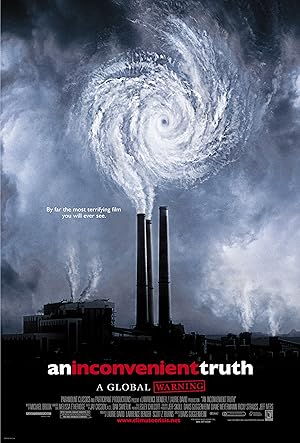
An Inconvenient Truth Page #8
But the very same frog,
if it jumps into a pot of lukewarm water
that is slowly brought to a boil,
will just sit there and it won't move.
It'll just sit there, even as the
temperature continues to go up and up.
It'll stay there, until...
Until it's rescued.
It's important to rescue the frog.
But the point is this.
Our collective nervous system is like
that frog's nervous system.
It takes a sudden jolt sometimes
before we become aware of a danger.
If it seems gradual,
even if it really is happening quickly,
we're capable of just sitting there
and not responding.
And not reacting.
I don't remember a time
when I was a kid
when summertime didn't mean
working with tobacco.
It was just... I used to love it.
It was during that period
when working with the guys on the farm
seemed like fun to me.
Starting in 1964,
with the Surgeon General's report,
the evidence was laid out
on the connection
between smoking cigarettes
and lung cancer.
We kept growing tobacco.
Nancy was almost 10 years
older than me,
and there were only the two of us.
She was my protector
and my friend at the same time.
She started smoking
when she was a teenager
and never stopped.
She died of lung cancer.
That's one of the ways
you don't want to die.
The idea that we had been
part of that economic pattern
that produced the cigarettes,
that produced the cancer,
it was so...
It was so painful on so many levels.
My father, he had grown tobacco
all his life. He stopped.
Whatever explanation
had seemed to make sense in the past,
just didn't cut it anymore.
He stopped it.
It's just human nature to take time
to connect the dots. I know that.
But I also know that there can be
a day of reckoning
when you wish you had connected
the dots more quickly.
There are three misconceptions in
particular that bedevil our thinking.
First, isn't there a disagreement
among scientists
about whether the problem
is real or not?
Actually, not really.
There was a massive study
of every scientific article
in a peer-reviewed journal written
on global warming for the last 10 years.
And they took a big sample of 10%,
And you know the number of those that
disagreed with the scientific consensus
that we're causing global warming
and that it's a serious problem?
Out of the 928, zero.
The misconception that there's
disagreement about the science
has been deliberately created
by a relatively small group of people.
One of their internal memos leaked.
And here's what it said,
according to the press.
Their objective is to reposition
global warming
as theory rather than fact.
This has happened before.
After the Surgeon General's report.
One of their memos leaked
"Doubt is our product,
"since it is the best means of creating
a controversy in the public's mind."
But have they succeeded?
You'll remember that there were
Zero percent
disagreed with the consensus.
There was another study of all
the articles in the popular press.
Over the last 14 years,
they looked at a sample of 636.
More than half of them said,
"Well, we're not sure. It could be
a problem, may not be a problem."
So no wonder people are confused.
Hey.
What did you find out?
Working for who?
Chief of Staff?
I'm gonna...
That's the White House
environment office.
American Petroleum Institute. It's fair
to say that's the oil and gas lobby.
Is that fair?
Totally fair.
Do a little bit more and see
who his clients were.
So he was defending
the Exxon Valdez thing.
Uh, very. Thank you.
Scientists have
an independent obligation
to respect and present the truth
as they see it.
Why do you directly contradict yourself
in the testimony you're giving
about this scientific question?
The last paragraph in that section
was not a paragraph which I wrote.
That was added to my testimony.
If they force you to change
a scientific conclusion,
it's a form of science fraud by them.
You know, in the Soviet Union,
ordering scientists
to change their studies to conform
with the ideology...
I've seen scientists
who were persecuted,
ridiculed,
deprived of jobs, income,
simply because the facts
they discovered
led them to an inconvenient truth
that they insisted on telling.
He worked for
the American Petroleum Institute.
And in January of 2001,
he was put by the president in charge
of environmental policy.
He received a memo from the EPA
that warned about global warming
and he edited. He has no
scientific training whatsoever.
But he took it upon himself
to overrule the scientist.
I said, "I want to see
what this guy's handwriting looks like."
This is the memo from the EPA.
These are his actual pen strokes.
He says, "No, you can't say this.
This is just speculation."
This was embarrassing
to the White House,
so this fellow resigned a few days later.
And the day after he resigned,
he went to work for Exxon Mobil.
You know, more than 100 years ago,
Upton Sinclair wrote this.
That it's difficult to get a man
to understand something
if his salary depends upon
his not understanding it.
The second misconception.
Do we have to choose between
the economy and the environment?
This is a big one.
Lot of people say we do.
I was trying to convince
the previous administration,
the first Bush administration,
to go to the Earth Summit.
And they organized
a big White House conference
to say, "Oh, we're on top of this."
And one of these view graphs
caught my attention.
And I want to talk to you about it
for a minute.
Now here is the choice
that we have to make
according to this group.
We have here a scales that balances
two different things.
On one side, we have gold bars.
Don't they look good?
I'd just like to have
some of those gold bars.
On the other side of the scales,
the entire planet.
I think this is a false choice
for two reasons.
Number one, if we don't have a planet...
The other reason is that
if we do the right thing,
then we're gonna create a lot of wealth
- and we're gonna create a lot of jobs.
- Yes.
moves us forward.
I've probably given this slide show
I would say, at least 1,000 times.
Nashville to Knoxville
to Aspen and Sundance.
Los Angeles and San Francisco.
Portland, Minneapolis.
Boston, New Haven, London, Brussels,
Stockholm, Helsinki,
Vienna, Munich, Italy and Spain
and China, South Korea, Japan.
Thank you.
I guess the thing I've spent more time
on than anything else in this slide show
is trying to identify
all those things in people's minds
that serve as obstacles
to them understanding this.
And whenever I feel like
I've identified an obstacle,
I try to take it apart, roll it away.
Move it.
Demolish it, blow it up.
I set myself a goal.
Communicate this real clearly.
The only way I know to do it
is city by city,
person by person,
family by family.
- Bye-bye. Thank you again.
- Bye.
And I have faith that pretty soon
enough minds are changed
that we cross a threshold.
Translation
Translate and read this script in other languages:
Select another language:
- - Select -
- 简体中文 (Chinese - Simplified)
- 繁體中文 (Chinese - Traditional)
- Español (Spanish)
- Esperanto (Esperanto)
- 日本語 (Japanese)
- Português (Portuguese)
- Deutsch (German)
- العربية (Arabic)
- Français (French)
- Русский (Russian)
- ಕನ್ನಡ (Kannada)
- 한국어 (Korean)
- עברית (Hebrew)
- Gaeilge (Irish)
- Українська (Ukrainian)
- اردو (Urdu)
- Magyar (Hungarian)
- मानक हिन्दी (Hindi)
- Indonesia (Indonesian)
- Italiano (Italian)
- தமிழ் (Tamil)
- Türkçe (Turkish)
- తెలుగు (Telugu)
- ภาษาไทย (Thai)
- Tiếng Việt (Vietnamese)
- Čeština (Czech)
- Polski (Polish)
- Bahasa Indonesia (Indonesian)
- Românește (Romanian)
- Nederlands (Dutch)
- Ελληνικά (Greek)
- Latinum (Latin)
- Svenska (Swedish)
- Dansk (Danish)
- Suomi (Finnish)
- فارسی (Persian)
- ייִדיש (Yiddish)
- հայերեն (Armenian)
- Norsk (Norwegian)
- English (English)
Citation
Use the citation below to add this screenplay to your bibliography:
Style:MLAChicagoAPA
"An Inconvenient Truth" Scripts.com. STANDS4 LLC, 2025. Web. 23 Feb. 2025. <https://www.scripts.com/script/an_inconvenient_truth_2787>.







Discuss this script with the community:
Report Comment
We're doing our best to make sure our content is useful, accurate and safe.
If by any chance you spot an inappropriate comment while navigating through our website please use this form to let us know, and we'll take care of it shortly.
Attachment
You need to be logged in to favorite.
Log In